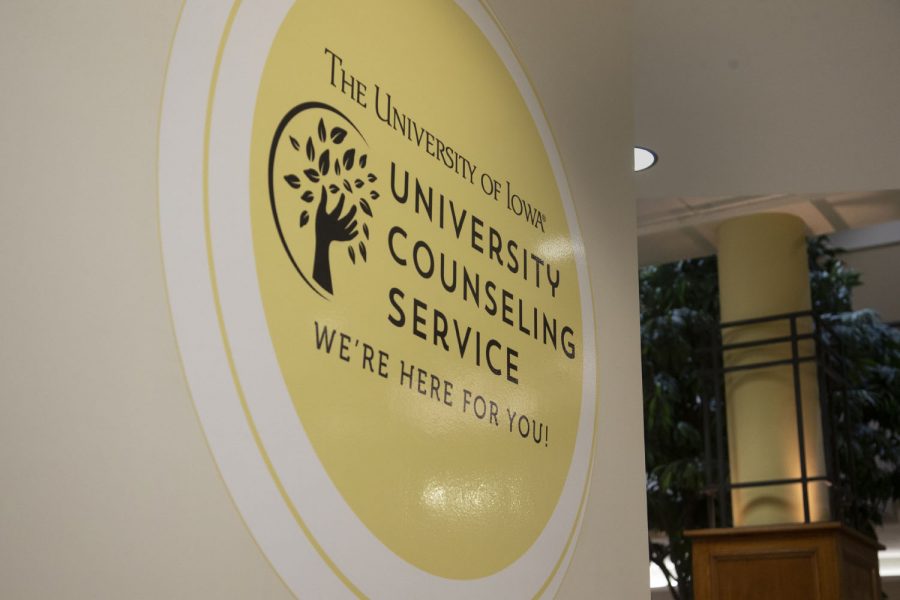UI counseling services data shows no significant increase in reported student mental-health symptoms despite COVID-19
UCS symptomology data from 2020 shows only slight increases in academic and family stressors reported by students compared to 2019, with seven other symptoms remaining consistent, and suicidal ideation trending downward.
The University Counseling Services office is seen in the Old Capital Mall on Monday, February 17, 2020.
September 24, 2020
The University of Iowa University Counseling Service (UCS) recently compiled the mental-health data it shares with the Center for Collegiate Mental Health to analyze any trends arising from student usage of mental health care services during the COVID-19 pandemic.
The data showed the rates of 10 mental-health symptoms reported by UI students during the 2018-2019 school year and compared it with the symptoms reported during the 2019-2020 school year in the midst of the COVID-19 pandemic, finding only small deviations in mental health symptoms between the two years.
“Students, at least those that come to the University Counseling Services, are overall not reporting much higher mental-health symptomatology than they were a year ago,” Director of UCS Barry Schreier said at a recent Undergraduate Student Government meeting where he presented the data.
The data shows the biggest increases were from students reporting family and academic distress.
“That’s because [they] all went home; that would be my guess there. And then [for] academic distress, [it’s] because everything just got turned on its ear so quickly in March and there was sort of no time to prepare, or do anything except frankly flee,” Schreier said.
The data also shows the rates of suicidal ideation among students seen at UCS went down between the months of March and May compared to the year before.
The UI shut down campus in March and many students went home to finish out the semester remotely, but this was not cited as a direct cause to the decrease in suicidal ideations.
RELATED:UI Students share the mental implications that come with receiving positive test results
Because of the high transmissibility of the virus, most of UCS’s services are being administered to students virtually. Schreier said his staff has done a good job of coming up with ways to connect with students remotely, and that in the next couple of weeks, UCS will start to perform satisfaction surveys to gauge students’ perceptions on the effectiveness of online counseling.
“The profession has been researching tele-mental health for a decade, and the data says that it’s equivalent [to in-person counseling]. If there’s something that makes a difference, it comes down to the user’s expectation,” Schreier said.
Undergraduate Student Government’s Director of Health and Safety Verona Victoria said she thinks telehealth is an effective mental-health service, especially given the constraints imposed by the COVID-19 pandemic.
“I think that students are responding fairly well to it. I think that one thing that telehealth provides is a comfortable space through which students are able to talk about what they’re struggling with, and to develop that connection, even in a virtual space with your provider, could be really helpful as [they] navigate [the pandemic],” Victoria said.
UI’s Student Health Center also sees students for mental-health care needs as well as for other services, and Director of UI Student Health Paul Natvig said his perceptions of student’s mental-health care needs align with the data collected by UCS.
“Really there hasn’t been necessarily an increase in things, other than obviously testing for COVID-19, which has taken over a lot of what we do,” Natvig said.
He added that he is concerned that COVID-19 has caused students to put off care.
“That’s kind of hard to track because it’s too short a timeframe, and we expect we’ll catch up on some of that, but we know the numbers are down a bit,” Natvig said.
RELATED: UI psychiatric professionals address mental health concerns around COVID-19
Despite the problems COVID-19 has caused, Natvig said he is proud of how his staff has risen to the challenge and adapted to online health care.
He said the UI is lucky to have a strong technology infrastructure, including high bandwidth internet service and the fact that most students have phones with high-quality cameras.
“Most of us didn’t really have much experience with [telemedicine]; we all learned on the fly,” Natvig said. “The primary care providers comment that sometimes they’re just amazed how well they can see a throat.”
Victoria said an important aspect of ensuring student health is communicating with the students, so they understand how to stay safe and how to navigate the university’s health-care system. Even after the pandemic, she said, mental health will still be an important aspect of a student’s life.
“Rest assured, regardless of what happens around us with COVID and mental health advocacy, normalizing those conversations is a continuous effort that will go beyond COVID,” Victoria said. “Utilize mental-health services; they’re really important.”
Resources:
University Counseling Services: call (319) 335-7294 to make an appointment or visit the UCS webpage for more information.
CommUnity Crisis line: 1-855-325-4296




















